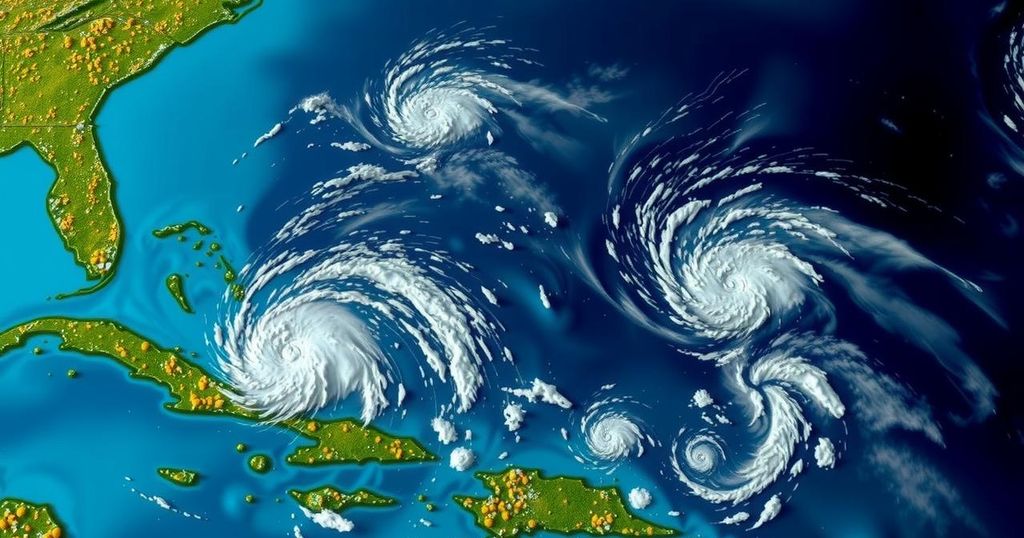The 2024 Atlantic hurricane season ended with 11 hurricanes, exceeding the average of seven. Major storms like Hurricane Helene were notably deadly, causing over 200 deaths and massive destruction worth billions. Meteorologists attributed the season’s unusual intensity to warm ocean temperatures, influenced by climate change.
The 2024 Atlantic hurricane season concluded on Saturday, featuring an unprecedented total of 11 hurricanes, significantly exceeding the average of seven. This season’s intense storm activity resulted in widespread devastation far beyond the immediate coastal areas of the U.S. Gulf Coast. Meteorologists characterized the season as “crazy busy” due to extraordinarily warm ocean temperatures, which enabled eight hurricanes to make landfall in regions such as the U.S., Bermuda, Cuba, the Dominican Republic, and Grenada.
Hurricane Beryl distinguished itself as the first-ever Category 4 hurricane recorded in June, impacting the island of Carriacou in Grenada, where it caused significant damage and resulted in fatalities. Following its landfall, Beryl intensified into the earliest Category 5 hurricane in Atlantic history by July 1. Typically, major hurricanes of Category 3 or above do not emerge until September 1, highlighting the unusual pattern of this year’s hurricane activity.
In September, Hurricane Helene wreaked havoc on the southeastern United States, becoming the deadliest storm to affect the U.S. mainland since Hurricane Katrina in 2005, claiming over 200 lives. The state of North Carolina reported damages amounting to at least $48.8 billion, with destruction impacting homes, water systems, agriculture, and forests across Florida, Georgia, South Carolina, Tennessee, and Virginia as well.
October brought Hurricane Milton, which rapidly intensified and peaked with maximum wind speeds of 180 mph, ranking among the strongest hurricanes measured in the Gulf of Mexico. The aftermath saw rainfall in areas affected by Helene and Milton surge to three times their usual September and October rates, with cities such as Asheville, Tampa, and Orlando recording their wettest periods on record.
In November, Hurricane Rafael approached the strength of the strongest November hurricane on record in the Gulf of Mexico, with wind speeds reaching 120 mph, tying with Hurricane Kate from 1985. Rafael’s landfall in Cuba compounded the difficulties faced by the island, still recuperating from Hurricane Oscar’s earlier impacts.
Researchers cite the ongoing effects of climate change, particularly the release of planet-warming gases such as carbon dioxide and methane, as a major contributor to the rising temperatures of oceans, which stimulate hurricane formation and intensification in atypical periods and locations. Brian McNoldy, a hurricane expert at the University of Miami, noted, “In other words, we never had a storm as strong as Beryl so early in the season anywhere in the Atlantic and we never had a storm as strong as Milton so late in the season in the Gulf of Mexico.” Furthermore, he remarked, “I don’t ever point to climate change as causing a specific weather event, but it certainly has its finger on the scale and makes these extreme storms more likely to occur.”,”background”:”The Atlantic hurricane season runs annually from June 1 to November 30. With ocean temperatures acting as a significant contributor to hurricane activity, this season’s unusual pattern is attributed to higher temperatures linked to climate change. This season displayed notable extremes in storm intensity and timing, leading meteorologists to redefine expectations around hurricane trends. Understanding these shifts is crucial for emergency preparedness and risk management as climate change continues to become a prominent factor in weather phenomena.”,”quotes”:[{“quote”:”In other words, we never had a storm as strong as Beryl so early in the season anywhere in the Atlantic and we never had a storm as strong as Milton so late in the season in the Gulf of Mexico.”,”author”:”Brian McNoldy”},{“quote”:”I don’t ever point to climate change as causing a specific weather event, but it certainly has its finger on the scale and makes these extreme storms more likely to occur.”,”author”:”Brian McNoldy”}],”proof_to_links”:[],”conclusion”:”The 2024 Atlantic hurricane season concluded with a record 11 storms, surpassing expectations and highlighting the growing influence of climate change on hurricane patterns. Major storms caused extensive damage and loss of life, particularly with Hurricanes Helene and Milton. The increasing frequency and intensity of hurricanes necessitate ongoing research and preparedness to mitigate the impact of such extreme weather events in the future.”,”title”:”2024 Atlantic Hurricane Season: A Record 11 Storms and Rising Concerns”} }}}} `
The Atlantic hurricane season runs annually from June 1 to November 30. With ocean temperatures acting as a significant contributor to hurricane activity, this season’s unusual pattern is attributed to higher temperatures linked to climate change. This season displayed notable extremes in storm intensity and timing, leading meteorologists to redefine expectations around hurricane trends. Understanding these shifts is crucial for emergency preparedness and risk management as climate change continues to become a prominent factor in weather phenomena.
The 2024 Atlantic hurricane season concluded with a record 11 storms, surpassing expectations and highlighting the growing influence of climate change on hurricane patterns. Major storms caused extensive damage and loss of life, particularly with Hurricanes Helene and Milton. The increasing frequency and intensity of hurricanes necessitate ongoing research and preparedness to mitigate the impact of such extreme weather events in the future.
Original Source: www.arkansasonline.com






